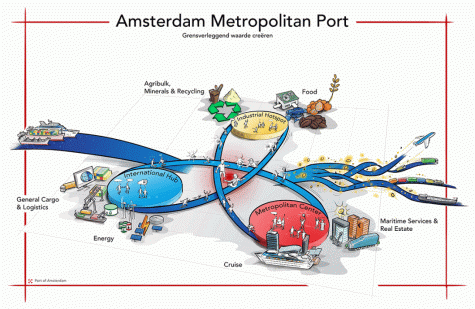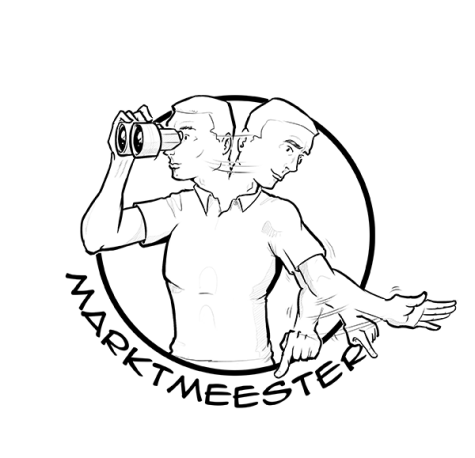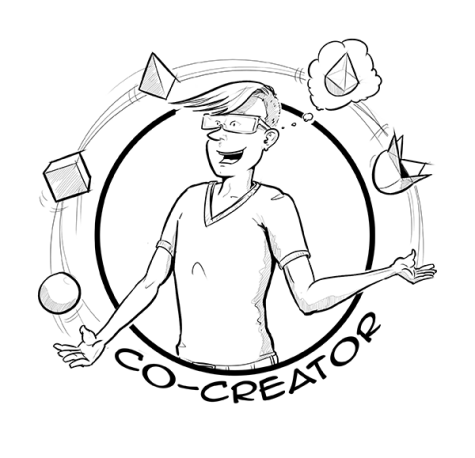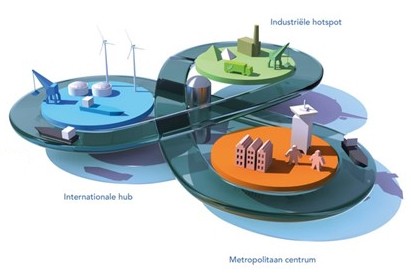Vision 2030
Together with major stakeholders, Port of Amsterdam has formulated a vision on the development of the port for the period up to 2030. This was adopted by our shareholder, the municipality of Amsterdam, in June 2015.
Our vision in short
The Amsterdam port region has potential. This is due to its strategic location on the North Sea and Rhine, which makes the port a world-class logistics hub. And also because of the link with the Amsterdam metropolitan region. This offers specific opportunities for the future. Opportunities for new niches, interesting jobs and sustainable growth.
The port authority wants to take full advantage of these opportunities by combining the strengths of the three strong centres of the Amsterdam metropolitan region:
- The international logistics function (international hub)
- The high quality regional industry (industrial hotspot)
- The versatile service centre of Amsterdam (metropolitan centre)
Synergy and innovation
In 2030 the Amsterdam port region will be more than a transhipment point. It is a dynamic international metropolitan port, characterised by cross-pollination between:
- The port, industry and circular economy of the city and region
- Global cargo flows, regional recycling, local energy production and manufacturing
- Logistics and business-to-business financial services
The interwovenness between flows and sectors makes it possible to quickly mobilise knowledge and skills to innovate, and ensures synergy and innovation.

Six clusters
The port of 2030 has six core clusters: Energy, General Cargo & Logistics, Cruise, Agri bulk Minerals & Recycling, and Maritime Services & Real Estate. These are already present, but we are going to further strengthen them so that they deliver even more value.
These clusters form the basis from which we also develop new markets and activities.
Port innovation
Opportunities for new niches and innovation arise at the intersections of the core clusters, the service sector and industry. We focus on the energy transition, sustainable 'bio-based' activities and the circular economy, which involves the recovery of raw materials and energy from waste and residual flows.
Other focus areas for innovation are safety & supervision, and logistics. The port will become a testing ground for new concepts and technologies.
Three roles

Market Master
Strengthening the port’s clusters. By facilitating customers and by raising the strong foundation in the nautical, infrastructure and commercial field (space, accessibility, safety, efficiency, business development climate) to the absolute highest level.

Matchmaker
Connecting people, organisations, ideas, flows, processes and sectors. In order to realise synergy and innovation across the entire chain and region.

Co-creator
Achieving innovations that strengthen the port. By co-developing, co-participating and co-investing as a partner.
Value creation
The interplay between the three cores, the six clusters and the three roles results in quality, innovation and value. Not only in familiar but also in new areas. That is why our mission is breakthrough value creation.
To achieve this, cooperation is essential: Port of Amsterdam, Port of partnerships.
Participatory process
The process of creating Vision 2030 started in 2013. We involved our clients and stakeholders in various ways, through interviews, round table discussions and workshops. We set up the process entirely for dialogue and participation. We were keen to formulate the vision in consultation with our environment.
Clients and stakeholders we involved in the process:
- Clients
- (Port) business region
- Nautical service providers
- Cooperation partners
- Other port companies
- Business associations
- Networks (a.o. AEB, ALB, Amports, Topteam Energie, Ayop)
- Residents' associations
- NGOs
- Governments (central government, province, municipalities NZKG) and government institutions
- Knowledge institutes and students

From vision to strategy
Based on the vision, we have defined our strategy 2021-2025: Taking the lead.
By 2025, we want to be a leading European seaport, leading the transition to a sustainable society.
More about the strategy 2021-2025
